21 Reasons Why It’s Perfectly Okay to be a Night Owl
In this article, I will share information about the many reasons why it’s perfectly OKAY to be a night owl. Yes, I am a Night Owl. And there is nothing wrong with me! I was made this way! But I do believe the world needs more chronotype diversity! Keep reading to learn more.
We may never find an answer to the age old debate about whether it’s better to be a night owl or an early riser. You can easily go online and find plenty of research about both sides of this debate. And who knows? Maybe it’s not even necessary to find an answer to this question as long as you are striving to live your best life regardless of when you prefer to sleep.
But I think it’s important for people to learn that it’s okay to be a night owl so they don’t feel “less than” just because they prefer to be productive and successful at night!

Related Article: 30 Day Self-Care Challenge

What’s a Night Owl?
A night owl is someone who prefers to stay up later than most people at night and sleep later in the morning. A night owl personality tends to have creative bursts and extra energy late at night. Many night owls report that they do their best thinking and working late at night.
Most night owls tend to believe they are almost nocturnal — like an owl. But it can be challenging to be completely nocturnal in a world that operates mostly with work hours from 9am-5pm (or during daytime hours.)
Night owls would much prefer that work hours be later so they can wake up later and do their work into the evening. Ideally, some would be allowed to be an evening person on the job whereas they may do their best work in the evenings. Some night owls even prefer to work through the night.
In general, night owls tend to wake up naturally closer to 10am and don’t want to go to bed before 3am.
What’s an Early Bird?
People who prefer to rise early with the sun and go to bed when the sun goes down may be called morning larks. Larks are small energetic birds that wake up early and are naturally happy — singing as they fly off for their day.
Human larks get up and feel most energetic very early in the morning. They are ready to sieze each day soon after waking up. They consider themselves a morning person because they do their best thinking and working in the morning hours from dawn until noon.
In general, morning larks tend to naturally wake up before 6am and want to go to bed by 9pm.

Circadian Rhythms and Chronotypes
Scientists who study sleep behaviors believe that the human waking and sleeping pattern is influenced by genetics, biology, lifestyle, and even personality. Most people can very easily identify whether they are a night owl or a morning lark from a young age.
Sleep experts evaluate and counsel people about their sleep habits based on natural circadian rhythms and chronotypes. Let’s take a look at what these terms mean and how they influence your sleep hygiene.
What Does Chronotype Mean?
Scientists use the term, chronotype, to describe the tendencies that people have toward the time of day they prefer activity and rest. Your chronotype is the natural inclination of your body to sleep at a certain time. There is some research that indicates the brain composition is even different among different chronotypes.
In addition to having an influence on your personal sleep pattern, your chronotype influences your appetite, exercise, core body temperature, and even cortisol production. Your chronotype works within your natural circadian rhythm.
Chronotypes were first discovered in the 1970’s so it’s a relatively young science.
Chronotypes do not necessarily align exactly with night owl and morning lark tendencies because scientists who developed the concept of chronotypes identified four categories: the bear, the wolf, the lion, and the dolphin. Each chronotype is based loosely on the designated animals’ sleep patterns and habits. The study of sleep habits and patterns is really quite complicated. Read on.
With that being said, there are also studies that have identified SIX categories of chronotypes (not named after animals). So you can clearly see how complicated the study of sleep habits can be, right?
Furthermore, there are some sleep scientists who consider owls and larks to be two chronotypes, and swifts and woodcocks to be two additional chronotypes that fall somewhere in between! Now we are REALLY making things complicated, right?
However, regardless of which model they use, sleep scientists typically believe your chronotype can not be influenced by external factors because it is strongly based on genetics. And most scientists believe there is still much to be studied about chronotypes and how they relate to sleep and lifestyle. They also generally believe you should embrace your chronotype to meet your sleep needs so you have better energy during the day and can function optimally in all aspects of your life. This will help you align your life with your natural biological inclinations.
There are sleep specialists who give tests to determine your chronotype. There are even some tests on the Internet that you can take, although they are generally for informational purposes only — not for scientific or medical diagnosis.
So why learn your chronotype?
After a sleep expert diagnoses your chronotype, you will work together to develop a sleep plan and lifestyle plan that works with your body, instead of against it.

What Does Circadian Rhythm Mean?
Your circadian rhythm is closely related to your chronotype but it can be trained easier than your chronotype.
Your circadian rhythm is known as your internal clock. It influences all biological processes from sleeping to waking, and eating to exercising.
Circadian rhythms are physical, mental, and behavioral changes that follow a 24-hour cycle. These natural processes respond primarily to light and dark. They affect most living things, including animals, plants, and microbes.
However, individual differences exist in terms of when these processes occur within a 24-hour cycle. This is where your chronotype factors into your sleeping and waking pattern. And since chronotypes are believed to be genetic, it becomes more difficult to retrain or adjust these behaviors.
What happens if your natural circadian rhythm is disrupted? Changes in your sleep cycle, or even changes in your eating habits, may lead to cognitive and behavioral issues like diminished focus, vigilance, attention, motor skills, and memory. I think we’ve all felt this happen when we don’t get enough sleep or eat properly regardless of whether we are night owls or morning larks, right?
We can maintain a healthy circadian rhythm by the practicing good self care habits such as get enough sleep, eating properly, exercise, and manage stress.

Can You Change Your Sleep Patterns?
Becoming an early riser occurs naturally as we age. Some people believe these changes go back to the Stone Age. As the roles of hunters and gatherers in the tribe changed because men aged, evolutionary changes occurred. The elders of the tribe no longer had to hunt in the early morning hours, so their sleep patterns changed.
Today, on a short-term basis there are things you can do to help change, adjust, or reset your sleeping patterns. Avoid caffeine near bedtime, don’t nap during the day, use sleep affirmations, stick to a regular bedtime and wake-up time, create a relaxing routine in the evening, avoid the news before bedtime, manage stress, get regular exercise, etc. But these strategies tend to be more effective when your sleep pattern has been temporarily disrupted because of things such as time zone changes (jet lag), insomnia, or a new baby in the home.
Unfortunately, most sleep studies refer to these strategies as ways to adjust or reset your sleep patterns if they have been disturbed. These strategies are not always as successful with changing your lifelong sleep pattern — your circadian rhythm and your chronotype.
There are articles everywhere, and doctors who provide the same advice, about how to change your sleep habits. They all say the same things. And most experts believe it is possible to adjust your circadian rhythm because it’s more influenced by external factors such as the strategies everyone recommends.
But there is mounting evidence that it’s far more difficult to change your chronotype — if possible at all. And this is where the problem lies.
Since your chronotype is genetic, the external factors that might help adjust or reset your circadian rhythm are probably not going to work for your chronotype. Thus, intentionally trying to change your lifelong sleep pattern may be far more complicated than people once thought.
This is why sleep scientists today are moving in the direction of teaching people to work within their identified chronotype rather than try to change genetics.
By the way, did you know Sleep Doctors are called Somnologists? They specialize in sleep disorders. These doctors may have a background in psychology, neurology, biology, genetics, endocrinology, or a number of other specialties.
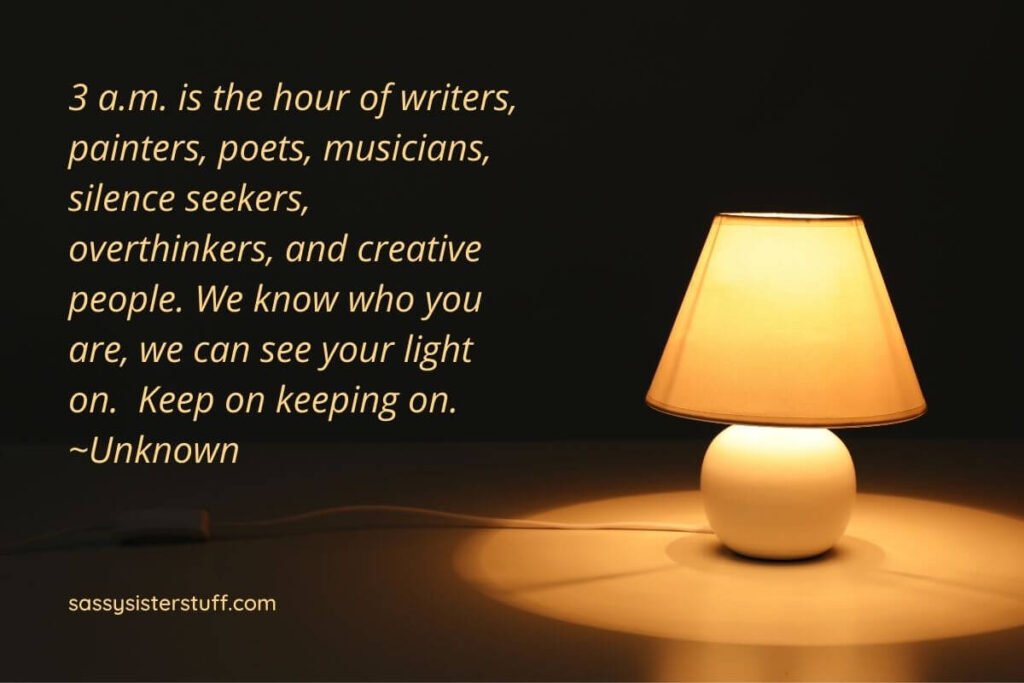
Benefits of Being a Night Owl
There are some research-based benefits of being a night owl. Most night owls have similar personality traits, qualities, and talents. These are 21 positive characteristics of a night owl:
- Creativity
- Mental and physical stamina
- Flexibility
- Intelligence
- Bursts of energy
- Round the clock duty, if necessary
- Better reasoning skills
- More time for hobbies
- Originality
- More time to destress
- Ability to meet deadlines
- Extended career opportunities
- Community engagement opportunities (discretionary time and energy in the evenings)
- Rich social life
- Time and commitment to self-development
- Collaborative spirit
- Strategic thinking capabilities
- Willingness to go above and beyond
- Strong social connections with other night owls
- Ability to stay focused for longer periods of time
- Require less sleep
As a Human Resources and Educational Leader, I had the opportunity to see all kinds of people in various workplace settings. Notably, people who identified as night owls were always the ones who were willing to step-up-to-the-plate when there was a last minute deadline or crisis that needed attention. They were also the ones who stepped-outside-the-box with creative problem solving solutions and didn’t mind making last minute changes in their schedule. They were rather consistently some of the most flexible people in a workplace.
From the list above, I BOLDED the three character traits I found most consistently in people who considered themselves night owls. It became interesting over time to watch a night owl operate and know they would be the first to volunteer to take on extra responsibilities without seeking special recognition or attention. Based on my experience as a supervisor and administrator, I rather consistently find night owls to be flexible, collaborative, and strategic in their thinking skills. These are great qualities that proved to be especially beneficial in the workplace.
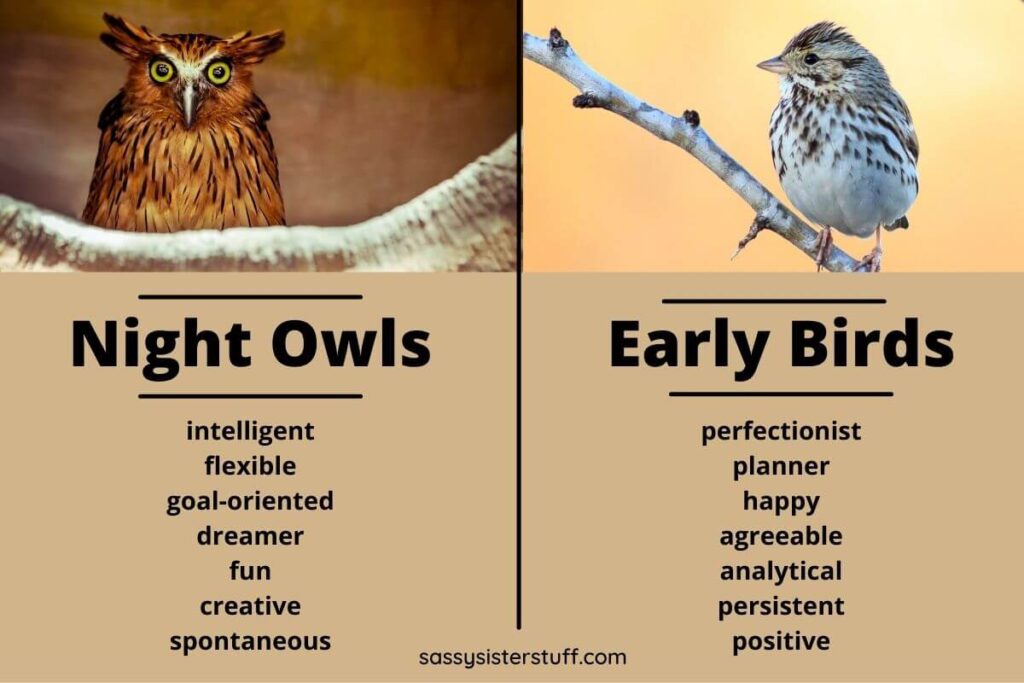
When Are Night Owls More Productive?
Night owls tend to have an energy peak that naturally occurs in the evening or night time. They feel refreshed and ready for action after the sun goes down and the rest of the world is settling down.
It might not be conducive to a good sleep pattern, but it is great for productivity! This is something that their early rising counterparts do not have.
Scientists have shown that night owls also have spinal cord excitability and an increase in motor cortex in the late evening hours. These physiological changes align with their high productivity, as well.
Statistically, researchers have proven that night owls are usually highly intelligent and have the ability to concentrate for very long periods of time — especially at night. They prefer to be uninterrupted.
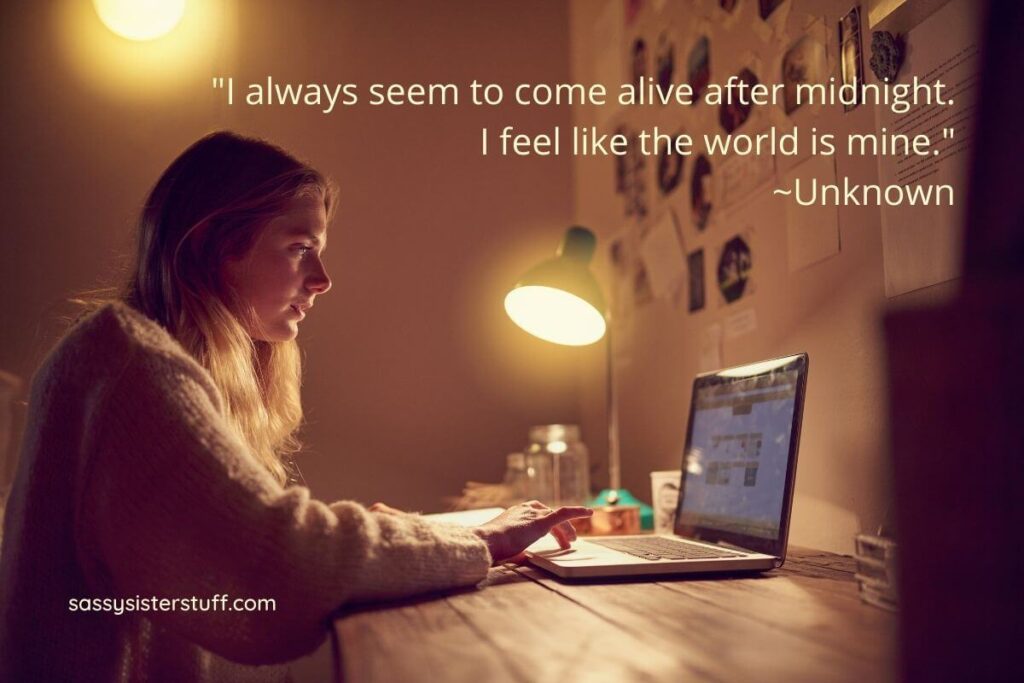
Can Night Owls Be Successful?
Yes indeed, night owls can be successful. In fact, scientific research has indicated night owls are great entrepreneurs because they are able to do the necessary behind-the-scenes work at night while also dealing with people during the regular work day.
They also have the ability to develop and maintain a flexible sleeping schedule.
Inc.com has a great article about 11 scientifically proven reasons why night owls get more done, and can be more successful than early birds. These are just some of those reasons night owls can be successful:
- They are likely to have creative bursts late in the evening.
- They are likely a workhorse because they can stay mentally alert much later than early birds.
- They find peace and tranquility in the evening/night and concentrate without interruptions for hours on end.
- They tend to stay calmer throughout the day, thus they can be productive.
- They can adapt to a 9 to 5 job if necessary, whereas early birds struggle if they don’t get to bed early.
You may be interested in checking out the article to learn more about how and why night owls can be successful!
Famous Successful Night Owls
If you still doubt that night owls can be successful and productive, consider this list of self-professed night owls:
- Elon Musk
- Barack Obama
- Winston Churchill
- John Travolta
- Christina Aguilera
- Bob Dylan
- Mark Zuckerberg
- Pharrell Williams
One last thing on the issue of success — and I honestly don’t share this to brag — but I have managed to live a fairly successful life that includes a career in education, speaking engagements, multiple degrees and certifications, raising a family and owning several homes with my husband, traveling all over the United States, and operating a successful website as a Night Owl. I may not be Elon Musk or Christina Aguilera, but I consider myself fairly successful and happy in life.
You can be successful and happy, too! However, please be sure to get proper sleep because it significantly impacts your mental health and heart health.
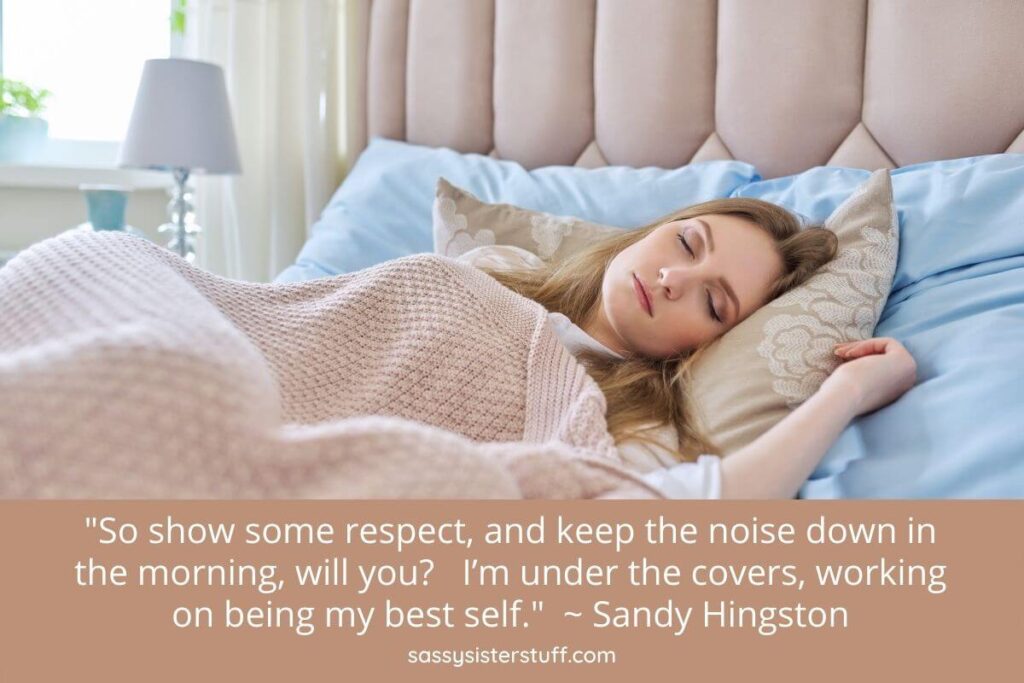
Can Night Owls Be Healthy?
While research suggests night owls have more difficulty maintaining a healthy lifestyle, it actually comes down to the fact that everyone needs to get enough sleep — both night owls and morning larks (and all chronotypes). Sleep should be a priority for anyone who is seeking to live a healthier lifestyle.
Additionally, planning time for self-care, exercise, personal growth, a healthy diet, friendships, and all the other aspects of a balanced life is important for everyone.
More researchers are starting to believe that unhealthy traits often associated with night owls are not based solely on genetics. There is mounting evidence in sleep research that many of these adverse traits are linked specifically to a mismatch between chronotype and work schedule. In other words, night owls with traits such as impulsivity, anger, depression, obesity, and substance abuse have developed these traits due to irregular sleep schedules caused by forced adaptation.
AARP Magazine published an article called “I’m a Night Owl, Deal with It” by Sandy Hingston. She makes some very good points in the article about how she has adapted her lifestyle to live “happy as a clam” as a night owl. She acknowledges that there is a higher rate of depression and other health issues in night owls, but she also points out that this is likely due to a lack of chronotype diversity in our world! It’s a funny article that you will enjoy reading! (I really like that concept of chronotype diversity! 🙂
Sandy believes that people developed different genetic chronotypes back in the Stone Age because someone needed to stay awake round-the-clock to protect the tribe from saber-toothed tigers! Then she goes on to remind us that we have a world that operates on a 24-hour round-the-clock infrastructure today, thus it’s a good thing we have night owls today, too!
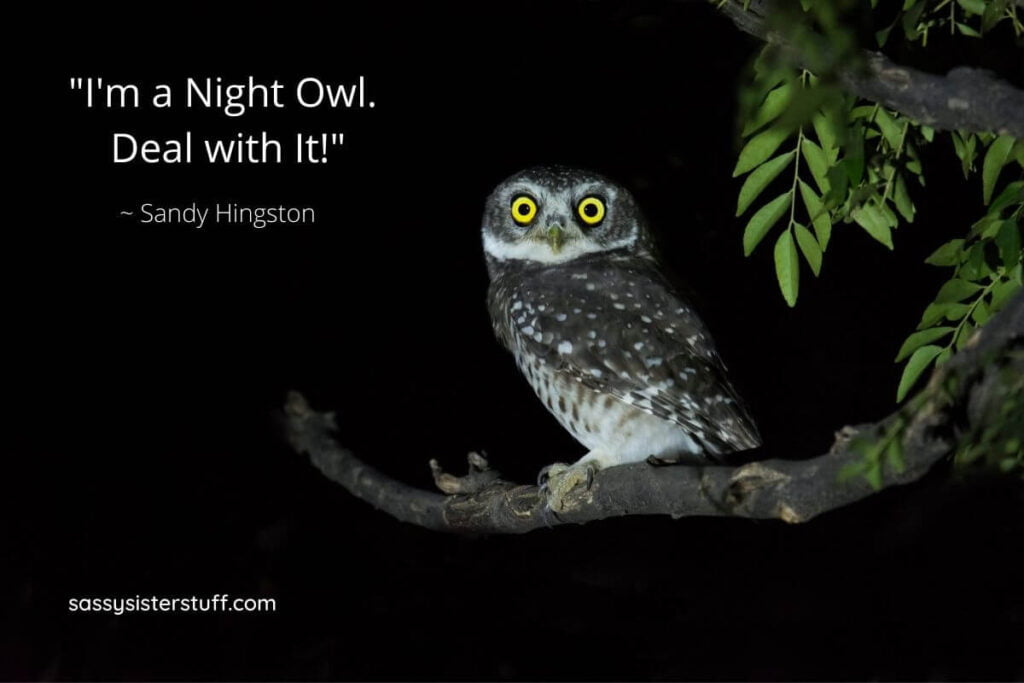
Final Thoughts: It’s Perfectly OKAY to be a Night Owl
If you would like to learn more about sleep hygiene, circadian rhythm, and chronotypes, I invite you to read two very thorough and interesting articles. One comes from my favorite website about sleep, Sleep Foundation. The other is a valuable resource for people looking to learn their chronotype, Rise Science. Both provide a lot of information about chronotypes and how knowing yours can help you live a happier, healthier, and more productive lifestyle.
Additionally, I want to mention a condition that is often associated with night owls. It is called Delayed Sleep Phase Disorder and it causes insomnia, morning sleepiness, and sleep deprivation. If you are seriously struggling with sleep hygiene, please consult a professional about your concerns. I am not a medical professional, and the information contained in this article is for the informational and educational purposes only. Make sure you are getting appropriate care from a professional.
Pin to Pinterest for Later
As a lifelong night owl, I can assure you that it is not always easy to live in a world that wakes up early and goes to bed early. I’ve always felt like I needed to adapt to the 9am to 5pm lifestyle or find a job at night!
However, the more I’ve learned about self care, personal growth, and wellness, I’ve come to realize it’s very possible to be a night owl in a world meant for morning larks!
Through my work and educational experiences, I’ve also had plenty of opportunities to develop a clear understanding about the importance of having all kinds of chronotypes in the workplace due to the different positive traits associated with each kind.
It seems to be a trend nowadays to write about creating a bedtime routine and a morning routine to make sure you’re going to bed early and getting up early to be productive. However, most of those writers aren’t night owls and they don’t include the newest sleep research in their articles.
While being a night owl (thanks to your special internal clock) has its own set of challenges, the newest research suggests it’s very difficult to change.
Plus, you can always set a bedtime routine and a morning routine for LATE… routines that align with your chronotype and circadian rhythm? Maybe that would be the best route to take if you are looking to make changes? What do you think?
In conclusion, the newest research suggests it is always best for people to work within the limits of their natural circadian rhythm and chronotype. This information is empowering in itself! Therefore, you may want to further explore this science for your own personal wellbeing. I plan to do so!
Personally, I feel more empowered than I ever have in my life because I now know I’m OKAY! There is nothing wrong with me! I was made this way!
And as Sandy Hingston says in her AARP article, “So show some respect, and keep the noise down in the morning, will you? I’m under the covers, working on being my best self.”
I’m going to go with the flow of my natural circadian rhythm and STOP feeling like I need to wake up at 6am everyday because the world seems to think I should! I’m living my best life and loving it!
Love to All! ~ Susan

